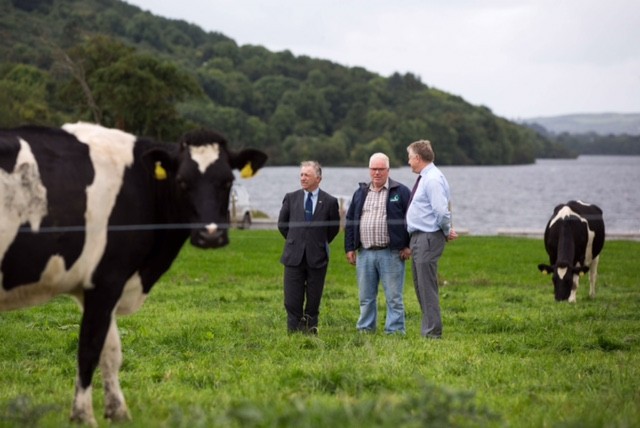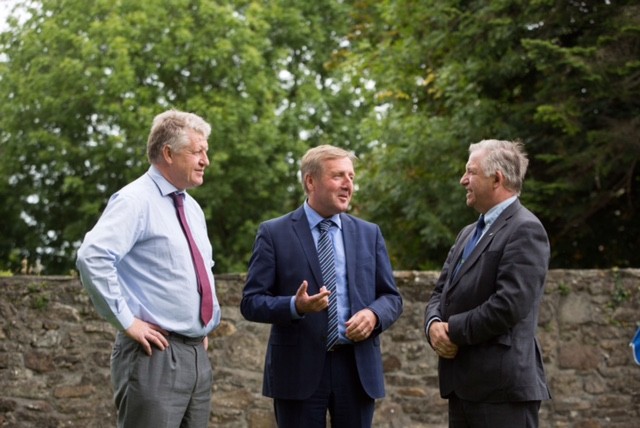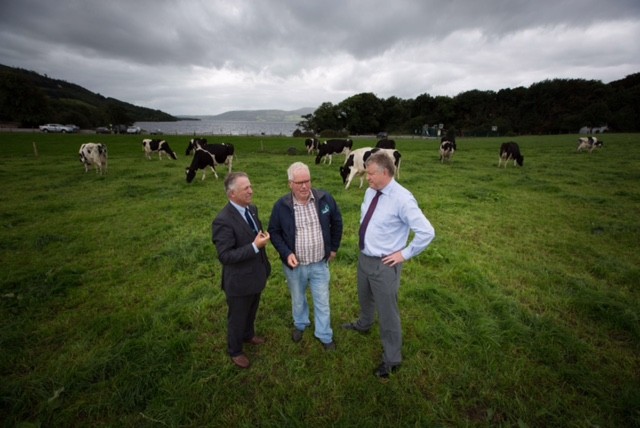
The Minister for Agriculture, Food and the Marine has launched new ‘Milk for Profit’ programme in conjunction with Teagasc.
Minister Michael Creed TD attended the event at the farm of Seamus and Brian Molamphy, Portroe, Co. Tipperary. The ‘Milk for Profit’ programme aims to promote the development of robust dairy systems capable of withstanding milk price volatility.
The Molamphys are one of five development farms within the joint programme. The five development farms have been selected to demonstrate the benefits of technology adoption and best practice in the areas of financial management and planning, compact calving, grass utilisation, breeding management, herd health and milk quality.
Progress on each farm will be documented and freely available to Arrabawn’s 950 suppliers. A series of workshops and open days will also to be delivered across the Arrabawn catchment to ensure suppliers are adequately informed in their efforts to adopt best practices in areas such as grassland, fertility, milk quality and cost control.
Video: Brian Ruane
Launching the programme, Minister Creed said: “Recent market volatility in the global dairy sector has highlighted again the need to maximise on-farm efficiency in order to remain competitive. Ireland is one of the world’s leading providers in terms of milk quality and our dairy farmers deserve to be supported with programmes like this that will ultimately help them get the best possible return for their efforts.
“Milk for Profit will ensure the five monitor farms will receive the very best expertise available from Arrabawn and Teagasc, with the on-farm learnings then passed on to other farmers across the co-op’s supplier network.”
Targets for the programme include increasing grass growth and utilisation on farms; upskilling suppliers in the areas of financial planning and budgeting and improving the six week calving rate and calving interval from the current co-op averages of 60% and 389 days, respectively. It will also seek to increase milk solids production per cow through optimum grassland management and improvements in herd fertility and milk quality.
Arrabawn has also established a specific ‘New Entrant Support’ aspect to the programme that will provide a dedicated service to new entrant suppliers, including one to one advice and exclusive meetings tailored to meet their specific needs.

Arrabawn CEO Conor Ryan said: “Maximising efficiencies are critical for any business but were not perhaps the priority over recent years when milk price was artificially high. We are witnessing a slight recovery at the moment but the market will remain challenged and Arrabawn, together with Teagasc, has launched this programme to support farmers in delivering greater efficiencies that will help them cope with price volatility going forward. Through the expertise of our own and Teagasc representatives, we will be working closely with the five development farms in Tipperary, Galway and Offaly to discover ways of improving efficiencies and will be passing that information on to our other suppliers.”
Director of Teagasc, Prof Gerry Boyle said; “Our own analysis has already shown that the most profitable dairy farmers are also the ones that are most likely to have adopted innovative practices on their farms.
For a number of years we have been looking at how to manage volatility in a post-quota environment, not least through efficiencies required to drive profitability at farm level. This programme will give us key insights from five farms across the Arrabawn network and the detail passed on from these farms to other suppliers will be of significant benefit in ensuring those efficiencies are profitable and achievable. We are delighted to be working with Arrabawn on this programme.”
Commenting at the launch Brian Molamphy said; “This is a great opportunity for us to get the best possible expertise available to see how we can drive efficiencies and profitability. Year one of the programme will largely be spent getting a baseline understanding of our operations and after that the Arrabawn and Teagasc experts will begin making their recommendations.
“We are looking forward to having this expertise on board and will be particularly keen to look at a number of specific areas, including grass management. We have pretty high stocking rates so we will be looking at how, in particular, we can maximise grass management and reduce the amount of supplement feed we need. We will also be keen to look at the finer details of breeding. We will be keen to look at anywhere we can find improvement.”
